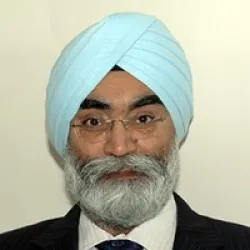Monetary Operations: Tools and Techniques for Policy Implementation - main page Q4
Monetary Operations: Tools and Techniques for Policy Implementation
Monetary Operations: Tools and Techniques for Policy Implementation
November 8 – 11
Chair: Francesco Papadia, former director general for market operations, European Central Bank
- What are the effects of pandemic-induced uncertainty on monetary policy?
- How is climate change impacting monetary policy strategy, conduct and implementation?
- How will digital currencies impact the monetary policy?
- What will be the spillover effects when major central banks withdraw stimulus?
These are some of the main challenges facing those working in monetary operations as they look ahead to 2022. As ever, they will look to manage expectations: internally and externally, among markets and stakeholders. Yet the uncertain nature of financial markets renders this communication far from straightforward.
This course is designed to equip central bankers to meet these challenges.
Each day will feature three hours of expert-led Live Content to maximise the opportunity to share and learn. The chair will ensure participants have opportunities to network throughout the course, culminating in the Practical Implementation Workshop.
Timings: 7am-11am (EST) | 12pm-4pm (GMT) | 8pm-12am (SGT)
Course agenda
Two weeks prior to your training course you will be emailed access to our content hub with course materials, including a trial to Central Banking if you are not already subscribed. There will be a combination of articles, reports and presentations that will contribute to two hours of preparation time for the live content. Presentations for the sessions will also be held here subject to the speaker approval.
Dealing with Disruptive Forces
12:00 – 12:15
Course introduction
Course introduction session led by the chair
06:00 - 06:15
- Introductions and welcome from the chairperson
- Overview of the training course
- Discussion of the delegate expectations
Francesco Papadia is chair of primary collateralised securities, chair of the selection panel of the Hellenic Financial Stability Fund, resident fellow of Bruegel and lectures at various universities. Between June 1998 and May 2012 he was director general for market operations at the European Central Bank. Before that he held different positions at Research Department and Foreign Department at the Bank of Italy. Between 1980 and 1983 he was economic advisor at the Directorate General for Economic and Financial Affairs of the European Commission. From 1974 to 1979 he served as economist in the Research Department of the Bank of Italy. He holds a degree in law from the University of Rome and did his postgraduate studies in economics at Istao, Ancona and at the London Business School. He has written numerous articles and books.
12:15 – 13:15
Climate risk and the ESG agenda: impact and implications for central banks
14:45 - 15:45
- Climate change as the emerging source of local and systemic instability
- Impact and implications for monetary policy strategy, conduct and implementation
- Overview of new roles and responsibilities for central banks in the areas of green finance and ESG
- Discussion: how are central banks tackling climate risk in the delegates’ home jurisdictions?
Born 1953, Mr. Grønn holds a graduate degree in economics (cand.oecon. 1979) from the University of Oslo. Work experience since 1980 includes vfarious positions at Norges Bank, including Director of International Department, Director of Statistics Department, and Special Advisor to the Governor. Mr. Grønn spent altogether eight years at IMF’s Executive Board in Washington DC, as Senior Advisor (1989-1992), Alternate Executive Director (2011-2013) and Executive Director (2013-2016), as well as one year at the ECB in Frankfurt as national central bank expert, monetary policy (2005-2006). He retired from his position at Norges Bank in July 2021, and continued as a consultant at the Bank on a part-time basis until December 2023.
13:15 – 13:30
Break
07:15 - 07:30
13:30 – 14:30
Monetary Policy in 2021: leaning against or with the wind?
07:30 - 08:30
- Assessment of dilemmas, conflicts and trade-offs between monetary operations and the financial stability mandate
- Implications for central banks’ independence and accountability
- Overview of key factors and dynamics that will shape the framework for monetary policy operations in the years to come
- Discussion: future of monetary policy in the delegates’ home jurisdictions
Francesco Papadia is chair of primary collateralised securities, chair of the selection panel of the Hellenic Financial Stability Fund, resident fellow of Bruegel and lectures at various universities. Between June 1998 and May 2012 he was director general for market operations at the European Central Bank. Before that he held different positions at Research Department and Foreign Department at the Bank of Italy. Between 1980 and 1983 he was economic advisor at the Directorate General for Economic and Financial Affairs of the European Commission. From 1974 to 1979 he served as economist in the Research Department of the Bank of Italy. He holds a degree in law from the University of Rome and did his postgraduate studies in economics at Istao, Ancona and at the London Business School. He has written numerous articles and books.
14:30 – 15:00
Networking break
14:30 - 15:00
15:00 – 16:00
Digital currencies and monetary policy: implications for monetary policy, central banks and central banking
08:45 - 09:45
- Taxonomy of Central Bank Digital Currencies (CBDCs), stable coins and crypto assets
- Impact and implications of CBDCs for markets and portfolios
- Opportunities and risks of CBDCs for monetary policy implementation
- Discussion: will Covid-19 speed the transition to digital currencies?
Tuomas Välimäki has been a member of the Board of the Bank of Finland since 12 July 2018. Tuomas Välimäki is responsible for investment of the Bank of Finland's financial assets, monetary policy implementation and market operations as well as academic research and research on transition economies. He is also responsible for cash supply and payments as well as digitalisation and IT issues.
Building an Effective Framework for Policy Implementation
12:00 – 13:00
What (not) to say to markets, when and how?
06:00 - 07:00
- The role of communication with markets in monetary policy design and implementation
- Forward guidance as a policy tool
- Examples of frameworks and processes ensuring that central banks’ messages are consistent and context-sensitive
- Practical examples: how to communicate in time of market stress or volatility
Niko Herrala works as a Head of Division in the Market Operations Department at the Bank of Finland. He is also a member of ESCB's Working Group on Monetary Policy Implementation.
13:00 – 13:15
Break
07:00 - 07:15
13:15 – 14:15
The new toolkit for optimising monetary policy operations
07:15 - 08:15
- Evolution of approaches for managing domestic liquidity and monetary policy operations
- Frameworks for tackling challenges at both strategic and day-to-day level
- Key features of the modern monetary operations toolkit
- Case study: monetary operations framework at the European Central Bank
Jesper Berg
Director general, Danish Financial Supervisory Authority and former head of market operations
National Bank of Denmark
14:15 – 14:30
Break
08:15 - 08:30
14:30 – 15:30
Monetary Policy in India: a case study of tackling spillovers
08:30 - 09:30
- Overview of monetary policy in India
- Capital flows and the Indian economy: a shifting dynamic
- Tips for managing flows and moderating impacts
- Discussion: the role of communication in responding to spillovers
Dr. Charan Singh is currently serving as the Non Executive Chairman of Punjab & Sind Bank. He was full time visiting faculty and former RBI Chair Professor (Dec 2012 to Dec 2016) at the Indian Institute of Management Bangalore, India where he taught comparative monetary policy and policy issues in Indian economy.
Earlier, he was a Senior Economist at the Independent Evaluation Office of the International Monetary Fund, Washington DC from August 2009 to November 2012 and Research Director (Departments: Economic Policy, Debt Management) at the Reserve Bank of India (1997–2009). Singh earned his doctorate in Economics from the University of New South Wales, Sydney, Australia. He was a visiting scholar for more than a year each at Department of Economics, Harvard University and the Stanford Center for International Development, Stanford University. He is now serving as Director on the Board of National Housing Bank, Delhi and NABARD Financial Services Ltd, Bangalore. He is also Member, Governing Board at Policy Foundation, New Delhi; Member of Research Advisory Committee, BIRD, National Bank for Agriculture and Rural Development; Honorary Fellow, SKOCH Development Foundation; and Member of the Informal Advisory Group on Housing Sector Issues, IMF, Washington DC
From Collateral to Liquidity Management: Emerging Risks and Opportunities
12:00 – 13:00
Financial soundness of central banks
06:00 - 07:00
- Assessment of potential losses: stock and flow
- Frameworks for monetary easing and yield curve control
- Mitigation of loss: the costs and benefits
- Normalizing policy: market implications and political reactions
Mr. Inoue joined the BOJ in 1985. Early in his career, he dealt with international financial support to heavily-indebted economies. After having studied Economics in Graduate School of Yale University, he returned to the Bank and conducted oversights of international business of Japanese banks. From 1994 to 1996, he served as secretary to Mr. Toshihiko Fukui when Mr. Fukui was Deputy Governor. In 1996, he moved to Institute for Monetary and Economic Studies, and was responsible for the research project on IT-Revolution. From 2000 to 2003, he served as staff to Mr. Kazuo Ueda, Member of the Policy Board. At Financial Markets Department, he worked for improving functioning of Japan’s capital markets. In 2004, he took over the head of Foreign Exchange Operations Division, and in 2006 he became Associate Director-General at the department. There he covered the global financial markets and policy measures and played a significant role in international financial fora (the BIS and the EMEAP).
In December 2008, he joined the Institute. At this position, he conducts studies of financial markets and policy issues both domestic and international. Platform of activity is the “Financial Markets Panel” that discusses central bank policies by designated members. He shares the insights with experts of both public and private sectors. He writes a number of articles in business journals and frequently appears as regular commentator of monetary policy by the major central banks in TV programs. In 2012, he launched “Japan-China Financial Roundtable” with the CF40 in China as the forum for policy debate. In 2015, he launched “Research forum for revitalizing regional financial institutions” and compiled its final report in 2017. In recent years, he expands the coverage to Central Bank Digital Currency (CBDC) by informal discussion with policy makers and organizes the study group of “Research Forum for Currency and Banking” with experts of this field. In relation to economic policy authorities, he was appointed Special Researcher by the Financial Services Agency in 2013 to study macroprudential policy issues. In 2015, he joined the small group of policy-makers and researchers at the Ministry of Finance to publish a joint report of financial policy since the global financial crisis. Since 2017, he has been Special Researcher at the Board of Audit to support their activities of official auditing of the Bank of Japan.
13:00 – 13:15
Break
07:00 - 07:15
13:15 – 14:15
Central bank asset purchases: lessons from recent global experience
07:15 - 08:15
- Motivations for launching asset purchase programmes
- Key components of programmes and realistic goals
- Risk and opportunities, in particular fiscal dominance and debt monetisation
- Key principles for central banks going forward
Simon Gray
Former regional advisor for Africa, the Middle East and Central Asia
International Monetary Fund
Simon Gray worked at the Bank of England for some 27 years before joining the IMF in 2007. Simon has recently retired, but over the past 25 years he has worked with central banks around the globe, predominantly on monetary operations framework and FX issues. He has written widely on these topics, both while in the Bank of England’s CCBS, and at the IMF, including most recently an IMF Working Paper on unifying exchange rates in countries where parallel exchange rate markets have emerged; and an IMF Departmental Paper on central bank asset purchases. Simon has also worked on a number of FSAPs, most recently leading the FSAP for China in 2017.
14:15 – 14:45
Networking break
An opportunity to share experiences with your fellow participants.
14:15 - 14:45
14:45 – 15:45
The importance of liquidity forecasts
08:30 - 09:30
- Liquidity forecast and exchange rate regime: different means and different goals
- Corridor vs. floor systems: implications for liquidity forecasting
- Market volatility and the regulatory demand for liquidity
- Liquidity forecasting tools and techniques
Miklos Vari is currently a Research Economist in the Bank of France monetary policy division, and a consultant for the IMF monetary and capital market department. He was previously an analyst in the ECB’s Directorate-General of market operations and an Economist at the International Monetary Fund. He has written policy papers and published academic articles in leading economics and finance economic journals on the impact of central bank’s market interventions. Miklos hold a PhD from the Paris School of Economics.
The Future of Monetary Policy
11:30 – 12:15
The 'Great Demographic Reversal': ageing societies, waning inequality, and an inflation revival
06:00 - 07:00
- Overview of disinflation across the last four decades
- Evolution of between-country and within-country inequality
- The reversal of demography and globalisation
- Case study: impact of an ageing society
Charles Goodhart was the Norman Sosnow Professor of Banking and Finance at the London School of Economics until 2002; he is now an Emeritus Professor in the Financial Markets Group there. Before joining the London School of Economics in 1985, he worked at the Bank of England for seventeen years as a Monetary Adviser, becoming a Chief Adviser in 1980. During 1986, Prof. Goodhart helped to found, with Prof. Mervyn King, the Financial Markets Group at London School of Economics, which began its operation at the start of 1987. In 1997, he was appointed one of the outside independent members of the Bank of England’s new Monetary Policy Committee until May 2000. Earlier he had taught at Cambridge and London School of Economics.
12:15 – 12:20
Break
12:15 - 12:20
12:20 – 13:00
What's next for central bank balance sheets?
12:20 - 13:00
- Quantitative easing: a remedy for liquidity problems
- Benefits and drawback of the shift to a floor system of money market operations
- Key components of quantitative easing as a generalised expansionary policy
- Discussion: the future of central bank balance sheets and money market operations
Charles Goodhart was the Norman Sosnow Professor of Banking and Finance at the London School of Economics until 2002; he is now an Emeritus Professor in the Financial Markets Group there. Before joining the London School of Economics in 1985, he worked at the Bank of England for seventeen years as a Monetary Adviser, becoming a Chief Adviser in 1980. During 1986, Prof. Goodhart helped to found, with Prof. Mervyn King, the Financial Markets Group at London School of Economics, which began its operation at the start of 1987. In 1997, he was appointed one of the outside independent members of the Bank of England’s new Monetary Policy Committee until May 2000. Earlier he had taught at Cambridge and London School of Economics.
13:00 – 13:15
Break
07:00 - 07:15
13:15 – 14:15
Fed and monetary policy response to Covid-19: recent developments, outlook and wider impact
07:15 - 08:15
- Understanding the state of the art of the Fed’s policy response to the economic impact of Covid-19
- Overview of strategic challenges in the context of the current economic and political climate
- Impact and implications for the global financial system
- Expectations in relation to further steps and policy developments
Patricia C. Mosser is director of the MPA Program in Economic Policy Management at Columbia University’s School of International and Public Affairs and leads the school’s Initiative on Central Banking and Financial Policy. Previously, she was head of research and analysis at the Office of Financial Research, U.S. Treasury. Mosser spent over 20 years at the Federal Reserve Bank of New York where she was senior manager at the New York Fed’s open market desk overseeing financial market analysis, monetary policy implementation, crisis-related facilities, foreign exchange and investment operations, and analysis of financial stability and reform. In 2009, she was SOMA manager for the FOMC. She previously served as an economist and manager in the New York Fed Research Department and as an assistant professor in the Economics Department at Columbia. Mosser has written on financial stability and monetary policy topics including financial reform, crisis policy tools, cyber risks to financial stability, and the monetary transmission mechanism. She was previously a consultant to the Bank of England, a member of the Deputies Committee of the Financial Stability Oversight Council, and a board member of the American Economic Association’s Committee on the Status of Women in the Economics Profession. Currently, she serves as an outside director of Nomura Holdings Incorporated. She received a BA from Wellesley College, an MSc with distinction from the LSE, and a PhD from MIT.
14:15 – 14:30
Break
14:15 - 14:30
14:30 – 15:00
Closing remarks and delegate action plans
Concluding session led by the chair
08:30 - 09:00
- Summary of the course
- Discussion of the observed trends and case studies
- Application of learning points in the delegates’ home organisations
- Preparation of action points
15:00 – 15:15
Feedback forum
We will send a link in this session to the feedback form and would kindly ask that you help us improve the training product by completing the survey. We would also welcome any verbal feedback in this session.
09:00 - 09:15
Date: November 25
The Implementation Workshop is a chair-led forum where attendees will have the opportunity to discuss challenges around implementing the ideas they have learnt during the Live Content. Prior to the workshop you will be emailed questions to prepare in order to gain the most from the session with peers.
13:00 – 14:00
Implementation Workshop
11:00 - 12:00
Benefits of attending the Implementation Workshop:
- Developments in the area since the live content sessions, including new resource material
- Questions arising since returning to the central bank
- Challenges of implementation: where are the roadblocks?
- Medium-term goals: what is realistic?
- Establishment of group network to keep in touch with peers and share best practices
Learning outcomes
At the conclusion of the training, participants will be able to:
- Understand the strategic challenges to monetary operations in the context of the economic and political climate
- Assess the implications and opportunities that CBDCs have on monetary policy
- Tackle the impacts that climate risk has on monetary policy
- Gain insight into the Libor transition and the key features of the SOFR framework
- Create liquidity forecasts and use tools and methods to overcome key challenges of volatile markets
Chair

Francesco Papadia
Former director general for market operations
European Central Bank
Francesco Papadia is chair of primary collateralised securities, chair of the selection panel of the Hellenic Financial Stability Fund, resident fellow of Bruegel and lectures at various universities. Between June 1998 and May 2012 he was director general for market operations at the European Central Bank. Before that he held different positions at Research Department and Foreign Department at the Bank of Italy. Between 1980 and 1983 he was economic advisor at the Directorate General for Economic and Financial Affairs of the European Commission. From 1974 to 1979 he served as economist in the Research Department of the Bank of Italy. He holds a degree in law from the University of Rome and did his postgraduate studies in economics at Istao, Ancona and at the London Business School. He has written numerous articles and books.








